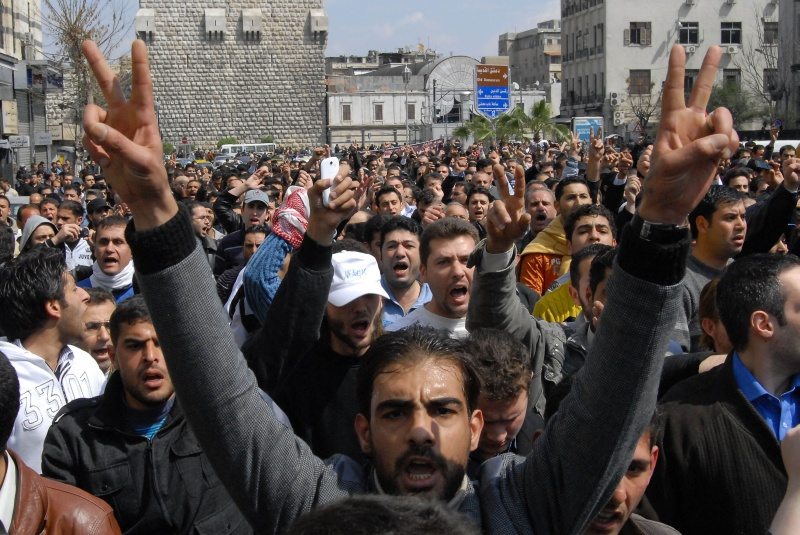Syrian President Bashar al-Assad said his country was in a state of war and ordered his new cabinet to crush the anti-regime uprising as Turkey vowed to retaliate for the downing of one of its jets.
Rebel forces and Syrian army units, meanwhile, engaged in deadly combat around elite Republican Guard posts in the suburbs of Damascus, as 116 people were killed across the country, a monitoring group said.
Amid mounting tensions in the anti-regime uprising now in its 16th month, Assad admitted that Syria is in a “real situation of war.”
“When one is in a state of war, all our policies and capabilities must be used to secure victory,” he told the new cabinet, the official SANA news agency reported.
The Syrian Observatory for Human Rights said Tuesday’s death toll comprised 68 civilians, 41 soldiers and seven rebels.
“Violent clashes are taking place around positions of the Republican Guard in Qudsaya and Al-Hama,” just miles away from central Damascus, Observatory head Rami Abdel Rahman told AFP in Beirut.
He said it was the first time that artillery was used “so close to the capital.”
The United States said a “desperate” Assad was slowly losing his grip on power, citing defections and fighting raging increasingly close to Damascus, and offered new support to its NATO ally Turkey after Syrian forces shot down one of its fighter planes last week.
“Clearly, Bashar al-Assad has been slowly — too slowly — losing his grip over his country,” White House spokesman Jay Carney said on Air Force One as President Barack Obama flew to a campaign event in Atlanta.
“I would note that recent high-level military defections to Jordan and Turkey are another testament to the regime’s loss of control over the situation in Syria.”
“It is clear, however, that Assad is desperate to hang on to power at all cost, as evidenced by his continued use of air power and Shabiha gangs,” Carney said, refering to the pro-regime militia in Syria.
Washington also pushed back on Russia’s insistence that Iran should take part in a planned international conference on Syria in Geneva on Saturday.
“It is better to involve Iran in the settlement (of the Syrian crisis),” Russian President Vladimir Putin told a news conference in Jordan on Tuesday. “In any case it would complicate the process (if Iran is ignored).”
In Ankara, meanwhile, Turkish Prime Minister Recep Tayyip Erdogan said his country had changed its rules of engagement and would now treat any Syrian security threat as a military target after Friday’s incident.
The shooting down of the Phantom F-4 fighter jet has split Moscow and the West, with NATO condemning Syria and voicing its solidarity with member state Turkey while Russia saying the incident should not be seen as intentional.
“We believe it is important that the incident is not viewed as a provocation or an intentional action, and that it does not lead to destabilising the situation,” the Russian foreign ministry said.
Erdogan raised the heat on the Assad regime by accusing it of shooting down the jet while it was in international airspace, without warning.
“This is a hostile act… a heinous attack,” Erdogan said.
“Turkey will exercise its rights, born out of international law, with determination, and take the necessary steps by determining the time, place and method by itself.”
Erdogan, once a close ally of Assad, has become one of the Syrian leader’s biggest critics and his reaction to the downing of the jet is his fiercest outburst to date.
Erdogan admitted the Turkish plane had violated Syrian airspace but said it was only for a short time and “by mistake,” insisting that it was not in Syrian airspace when it was shot down.
Damascus has defended the downing of the jet, saying it was a response to “a gross violation” of its sovereignty.
After a request from Turkey, NATO’s secretary-general Anders Fogh Rasmussen hosted talks with ambassadors of the alliance’s 28 members in Brussels.
“Allies have expressed their strong support and solidarity with Turkey,” Rasmussen said after the 90-minute meeting.
“We consider this act to be unacceptable and condemn it in the strongest terms.
“It is another example of the Syrian authorities’ disregard for international norms, peace and security, and human life,” he said as the jet’s two-man crew remain missing.
“Let me make this clear. The security of the alliance is indivisible. We stand together with Turkey in the spirit of strong solidarity.”
Turkey requested the consultations under Article 4 of NATO’s founding treaty, enabling any of the allies to call for talks should they consider their territorial integrity, political independence or security to be under threat.
But NATO has so far been notably reluctant to get sucked into the conflict in Syria.
The former chief of the main opposition Syrian National Council, Burhan Ghalioun, meanwhile, told AFP he visited Syria for a few hours on Tuesday to “boost the morale” of rebels.
Ghalioun, a senior SNC executive board member, spoke to AFP in Beirut by telephone after his first visit to Syria in more than two years, and said he entered the country secretly and had “discussions with revolutionaries.”
“The visit was also a bit to offer compassion to our people who have been killed, massacred and slaughtered” by regime forces, he added.
Meanwhile Amnesty International said on Tuesday three medics were tortured and killed in Syria a week after their arrest in the city of Aleppo in what it said was an “appalling disregard” for the profession.
All three men were students at Aleppo University — Basel Aslan and Musab Barad were fourth-year medical students and Hazem Batikh was a second-year English literature student and a first-aid medic, Amnesty said.
“The discovery of the charred and mutilated bodies of three young medical workers a week after their arrest in Aleppo city is yet further evidence of the Syrian government forces’ appalling disregard for the sanctity of the role of medical workers,” a statement said.










